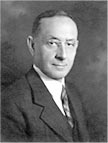Biography of Jackson Davis
 Jackson Davis was born in Cumberland County, Virginia, on September 25, 1882, the son of William Anderson and Sally Wyatt (Guy) Davis. He attended the public schools of Richmond, Virginia, and received his B. A. from the College of William and Mary in 1902 and his M. A. from Columbia University in 1908. Honorary L.L.D. degrees were conferred upon him by the University of Richmond in 1930 and the College of William and Mary in 1931.
Jackson Davis was born in Cumberland County, Virginia, on September 25, 1882, the son of William Anderson and Sally Wyatt (Guy) Davis. He attended the public schools of Richmond, Virginia, and received his B. A. from the College of William and Mary in 1902 and his M. A. from Columbia University in 1908. Honorary L.L.D. degrees were conferred upon him by the University of Richmond in 1930 and the College of William and Mary in 1931.
Following graduation from William and Mary he was the principal of the public schools of Williamsburg, Virginia. He was assistant secretary of the Roanoke, Virginia YMCA from 1903-1904, was principal of the public schools of Marion, Virginia from 1904-1905, and was superintendent of schools in Henrico County, Virginia from 1905-1909.
From 1909-1910 he was a member of the state board of examiners and inspectors of the Virginia State Board of Education, and from 1910-1915 he was state agent for African-American rural schools for the Virginia State Department of Education.
In 1915 he became affiliated with the General Education Board in New York, New York, as a field agent. Two years later he was transferred to New York city as the board’s general field agent, in which capacity he remained until 1929 when he was made assistant director. He became associate director in 1933 and vice-president and director in 1946.
Throughout his career Davis specialized in Southern education, interracial problems, and education in the Belgian Congo and Liberia. In 1935 he went to Africa as a Carnegie visitor, and in 1944 went again as head of a group sent by the Foreign Missions Conference of North America, the British Conference of Missions, and the Phelps-Stokes Fund. Davis was also a trustee of the Phelps-Stokes Fund, an organization devoted to African-American education and race relations both in America and in Africa. He became vice-president of the fund in 1940, and succeeded Anson Phelps Stokes as president in 1946.
During the years of his association with the General Education Board its work was concentrated on education in the Southern states and Davis’ influence on behalf of better relations and understanding between whites and African-Americans and his pioneer work in promoting regional centers of education in the South were of immense significance.
At the time of his death he was president of the board of trustees of Booker T. Washington Institute in Liberia, president of the New York State Colonization Society, and a member of the Commission on Interracial Cooperation and of the Advisory Committee on Education in Liberia. He served as a member of the board of visitors of the College of William and Mary during 1913-1920 and as secretary of the International Education Board from 1923-1938. Davis and Margaret Wrong co-authored Africa Advancing in 1946, a book providing the results of the survey made in 1944; he was also a frequent contributor to educational journals.
Davis was a member of the Sons of the American Revolution, Virginia Academy of Science, Virginia Historical Society, Phi Beta Kappa, Theta Delta Chi, Phi Delta Kappa, and the Town Hall and Century clubs. He was married in Bluffton, Georgia on May 9, 1911 to Corinne Mansfield ( -1941), and they had two daughters, Helen Mansfield (who married John Phillip Lynch, Jr.) and Ruth Elizabeth (who married Charles Rolfe Langhorne.)
Davis died in Cartersville, Virginia, on April 15, 1947. The Jackson Davis Collection was given to the Special Collections Department by Davis’ daughters, Helen Davis Lynch and Ruth Davis Langhorne, in 1948. Davis’ granddaughters, Sally Guy Brown and Helen Langhorne recently donated additional personal papers to the collection.
